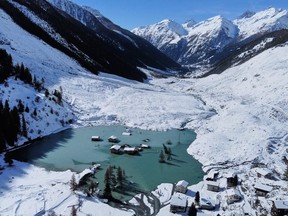
Contents of the article
BLATTEN, Switzerland (AP) — When a devastating landslide nearly consumed his Swiss village in May and destroyed his family's three-generation hotel, Lucas Kalbermatten was overcome by a feeling of emptiness before he was overcome by emotion. But he decided not to dwell on them for long and began restoration.
Advertisement 2
Contents of the article
The hotel owner's response sums up the thinking of many of Blatten's more than 300 residents: They could have left their rustic village in the southern Lötschental valley to die, but instead have decided to try to one day see it come to life again and are taking steps to rebuild.
Contents of the article
Contents of the article
Authorities evacuated villagers and livestock, but a 64-year-old man died when 9 million cubic meters of ice, rock and earth fell from the Kleins Nesthorn peak on May 28. The landslide left a trail about 2.5 kilometers (about 1 1/2 miles) wide and 100 meters (about 330 feet) high in places.
All this collapsed in about half a minute, covering the valley with plumes of dust. More than 90% of village houses and buildings were destroyed.
“A lot of people were emotional, of course, but I’m not too emotional,” Culbermatten said. “I was really realistic and the emotions came later, after three or four days.”
Contents of the article
Advertisement 3
Contents of the article
If the death toll had been higher, locals say, many might not have wanted to return to Blatten.
Kalbermatten, whose website for the Edelweiss Hotel in Blatten shows it half-sunk in a green pea soup pond created by the disaster, has teamed up with other local families to build a temporary hotel at the top of the gondola lift in the nearby village of Wieler, one of three villages in the valley to which most of Blatten's residents have moved.
“It is also a disaster for tourism in this valley because we will not have enough places for all the tourists,” he said on Tuesday. “The most important thing for us is to do something quickly.”
Laurent Hubert, co-owner of the Nest- und Bietschhorn hotel and restaurant near Blatten, said it was “blown to dust” last May. His wife Esther Bellwald is leading the construction of the new hotel with Kalbermatten. The company's website said employees' families were “deeply shocked and endlessly saddened” after the hotel's destruction.
Advertisement 4
Contents of the article
“This project is a little bit of light at the end of the tunnel,” Hubert said, sitting knee-deep in snow outside the construction site as crews in short sleeves work quickly under sunny skies on the planned Dec. 18 opening of the Momentum Hotel.
A 30-centimeter (12-inch) snowfall over the weekend has once again given the valley its white winter sheen.
In recent months, work crews have restored power and telecommunications lines in the Blatten area, used excavators to dig a drainage channel and cleared roads leading to Blatten, allowing some displaced residents to return briefly to pick up some belongings. Some used rowboats to reach the attics of flooded homes.
Others lined up to claim lost items found by cleanup crews: books, family photos and family heirlooms such as a wedding dress.
Advertisement 5
Contents of the article
Manfred Ebener, construction coordinator at Blatten, said about 400,000 cubic meters of rock and ice at the top of the mountain remain unstable, requiring delicate work during the warm summer and autumn months. Snowfall and cold temperatures have helped strengthen the rocks and ice overhead, reducing risks, but the frozen ground will make digging difficult.
“The movement is slowing down,” he said on a hillside overlooking a snow-covered mud cone, referring to the changing geology that caused the slide. “We're looking at next spring with some trepidation: the whole process will be reversed. When the snow melts, a lot of water gets back into the rock.”
Ebener says several years of clearing work followed by construction of a new village should pave the way for Blatten residents to move back by 2030. Meanwhile, the villagers – and much of Switzerland – must prepare for a new reality: global warming may leave its mark.
Swiss glaciologists have repeatedly expressed concern about a thaw in recent years, largely linked to global warming that has accelerated the retreat of glaciers in Switzerland.
“I'm not a scientist. I can't judge exactly what these climate changes have to do with this event,” he said. “But we live here in our valley and we see something happening.”
Contents of the article







